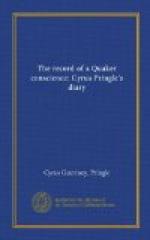The purpose of this volume is stated by the editor in these words: “I determined to bring together in one place in a convenient compendium, as it were, some gleanings from many and dusty tomes, some fragments of reality, in the hope that from them might radiate for others, as for me, shafts of light to penetrate the past.” The result is unique in the revelation afforded in the Puritans’ own words of their daily walk and conversation and of that inner temper which governed their public acts. The range is from orders for clothes and directions for an Atlantic voyage to the soul searchings of Cotton Mather and the spiritual ecstasies of Mrs. Jonathan Edwards.
The idea is a happy one, and Miss Hanscom carries it through with great tact and deftness.
THE MACMILLAN COMPANY
Publishers 64-66 Fifth Avenue New York
The Tree of Heaven
By MAY SINCLAIR
Cloth, $1.60
A singularly penetrating story of modern life, written in the author’s very best manner. The scheme, the root motive of the book, may be said to be a vindication of the present generation—the generation that was condemned as neurotic and decadent by common consent a little more than three years ago, but is now enduring the ordeal of the war with great singleness of heart. This theme, in Miss Sinclair’s hands, assumes big proportions and gives her at the same time ample opportunity for character analysis, in which art she is equalled by few contemporary writers.
THE MACMILLAN COMPANY
Publishers 64-66 Fifth Avenue New York
Fairhope: The Annals of a Country Church
By EDGAR DEWITT JONES
Cloth, 12mo., $1.25
Fairhope meeting-house is in the northermost country of Kentucky, in the midst of a populous farming community. In this book Mr. Jones, a life-long member of the community, tells the story of Fairhope meeting-house. The book is a remarkably sympathetic and appealing account of a phase of American rural life at a time when religion was always the uppermost topic in people’s minds.
“Simple narratives of our people, our preachers, and the lights and shadows of our rural religious life”—is the author’s modest description of his work. But this gives no hint of the book’s peculiar charm. Those who love birds and stretches of green meadow, glimpses of lordly and high hills, the soil and the sincere life lived on it, will find here a genuine delight.
Above all is the interest in the preachers themselves. “There were giants in those days, and for the most part our ministers were good and noble men. Of their goodness and sincerity these annals bear witness!”




